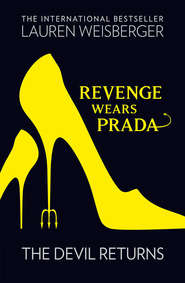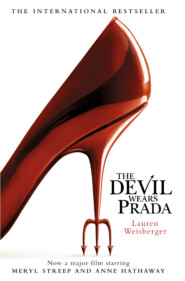По всем вопросам обращайтесь на: info@litportal.ru
(©) 2003-2025.
✖
Lauren Weisberger 5-Book Collection: The Devil Wears Prada, Revenge Wears Prada, Everyone Worth Knowing, Chasing Harry Winston, Last Night at Chateau Marmont
Настройки чтения
Размер шрифта
Высота строк
Поля
‘This, Andy, is what you should be wearing if you don’t want to get fired.’ He smiled, but he wouldn’t look me in the eye.
‘I’m sorry?’
‘Look, I just think you should know that your, uh, your look isn’t really going over well with everyone around here. Now, I know this stuff gets expensive, but there’s ways around that. I’ve got so much stuff in the Closet that no one will notice if you need to, uh, borrow some of it sometimes.’ He made quote marks with his fingers around the word ‘borrow.’ ‘And, of course, you should be calling all the PR people and getting your discount card for their designers. I only get thirty percent off, but since you work for Miranda, I’ll be surprised if they charge you for anything. There’s no reason for this, uh, Gap thing you’ve got going on to continue.’
I didn’t explain that wearing Nine West instead of Manolos or jeans they sold in Macy’s junior department but not anywhere on Barney’s eighth floor of couture denim heaven had been my own attempt to show everyone that I wasn’t seduced by all things Runway. Instead, I just nodded, noticing that he looked supremely uncomfortable having to tell me that I was humiliating myself every day. I wondered who had put him up to it. Emily? Or Miranda herself? Didn’t really matter either way. Hell, I’d already survived three full months – if wearing a Prada turtleneck instead of one from Urban Outfitters was going to help me survive the next nine, then so be it. I decided I’d start putting together a new and improved wardrobe immediately.
I finally made it outside by 6:50 A.M., actually feeling pretty damn good about the way I looked. The guy in the breakfast cart closest to my apartment even whistled, and a woman stopped me before I’d taken ten steps and told me she had been eyeing those boots for three months now. I could get used to this, I thought. Everyone’s got to put something on every day, and this sure felt a hell of a lot better than any of my stuff. As was now habit, I walked to the corner of Third Avenue and promptly hailed a cab and collapsed into the warm backseat, too tired to be thankful that I didn’t have to join the commoners on the subway, and croaked, ‘Six-forty Madison. Quickly, please.’ The cabbie looked at me through the rearview – with a touch of sympathy, I swear – and said, ‘Ah, yes. Elias-Clark building,’ and we squealed left onto 97th Street and made another left onto Lex, flying through the lights until 59th Street, where we headed west to Madison. After exactly six minutes, since there was no traffic, we came to a screeching halt in front of the tall, thin, sleek monolith that set such a fine physical example for so many of its inhabitants. The fare came to $6.40 like it did every single morning, and I handed the cabbie a ten-dollar bill, like I did every single morning. ‘Keep the change,’ I sang, feeling the same joy I did every day when I saw their shock and happiness. ‘It’s on Runway.’
No problem there, that’s for sure. It took all of a week on the job to see that accounting wasn’t exactly a strong suit at Elias, not even a real priority. It was never a problem to write off ten-dollar cab rides each and every day. Another company might wonder what gave you the right to take a cab to work in the first place; Elias-Clark wondered why you had deigned to take a cab when there was a car service available. Something about gypping the company out of that extra ten bucks each day – even though I don’t imagine anyone was directly suffering from my overspending – made me feel a whole lot better. Some might have called it passive-aggressive rebellion. I called it getting even.
I bolted from the cab, still happy to make someone else’s day, and walked toward 640 Madison. Although it was named the Elias-Clark building, JS Bergman, one of the most prestigious banks in the city (obviously), rented half of it. We didn’t share anything with them, not even an elevator bank, but it didn’t stop their rich bankers and our fashion beauties from checking each other out in the lobby.
‘Hey, Andy. What’s up? Long time, no see.’ The voice behind me sounded sheepish and unwilling, and I wondered why whoever it was didn’t just leave me alone.
I’d been mentally preparing myself to start the morning routine with Eduardo when I’d heard my name, and I turned to see Benjamin, one of Lily’s many ex-boyfriends from college, slumped against the building just outside the entrance, not even seeming to notice that he was sitting on the sidewalk. He was only one of many of Lily’s guys, but he’d been the first one she’d really, genuinely liked. I hadn’t spoken to good old Benji (he loathed being called that) since Lily had walked in on him having sex with two girls from her a capella singing group. Walked right into his off-campus apartment and found him sprawled out in his living room with one soprano and a contralto, mousy girls who never did manage to look at Lily again. I’d tried to convince her it was just a college prank, but she didn’t buy it. Cried for days, and made me promise not to tell anyone what she’d discovered. I didn’t have to tell anyone, though, because he did – bragged to anyone who would listen about how he’d ‘nailed two singing geeks,’ as he’d put it, while ‘a third one watched.’ He’d made it sound as though Lily had been there the entire time, agreeably perched on the couch and watching her big, bad man go about being manly. Lily had sworn to never let herself really fall for another guy, and so far seemed to be keeping her promise. She slept with plenty of them, but she sure didn’t let them stick around long enough to actually run the risk of discovering something likable about them.
I looked at him again and tried to find the old Benji in this guy’s face. He had been athletic and cute. Just a normal guy. But Bergman had turned him into a shell of a human. He was wearing an oversize, wrinkled suit and looked as though he was hoping to suck crack cocaine out of his Marlboro. He seemed already overworked even though it was only seven o’clock, and this made me feel better. Because it was payback for being an asshole to Lily, and because I wasn’t the only one dragging myself to work at such an obscene hour. He was probably getting paid $150,000 a year to be so miserable, but whatever, at least I wasn’t alone.
Benji saluted me with his lit cigarette, glowing eerily in the still dark winter morning, and motioned for me to come over. I was nervous I’d be late, but Eduardo gave me his ‘Don’t worry, she’s not here yet – you’re fine’ look and I walked over to Benji. He looked bleary-eyed and hopeless. He probably thought he had a tyrannical boss. Hah! If only he knew. I wanted to laugh out loud.
‘Hey, I noticed you’re the only one here this early every day,’ he muttered at me while I dug around in my bag for lipstick before hitting the elevators. ‘What’s the deal?’
He looked so tired, so beaten-down, that I felt a surge of sympathy and kindness. But then I felt my legs nearly give out from exhaustion, and I remembered the way Lily had looked when one of Benji’s dumb lacrosse buddies had asked if she’d been happy to watch or really actually wanted to join in, and I lost my cool.
‘Well, my deal is that I work for a rather demanding woman, and I need to get here two and a half hours before the rest of the goddamn magazine so that I’m prepared for her,’ I said, my tone dripping with anger and sarcasm.
‘Whoa. Just asking. Sorry, though, it sounds pretty bad. Which one do you work for?’
‘I work for Miranda Priestly,’ I said, and prayed for a non-reaction. Something about having a seemingly well-educated, successful professional have no idea who Miranda was made me very, very happy. Delighted almost. And luckily, this one didn’t let me down. He shrugged and inhaled and looked at me expectantly.
‘She’s the editor in chief of Runway,’ I lowered my voice and began with glee, ‘and pretty much the biggest bitch I’ve ever met. I mean, I’ve honestly never met anyone like her. She’s really not even human.’ I had a litany of complaints I would’ve liked to have dumped on Benji, but the Runway Paranoid Turnaround came on full-force. I became immediately nervous, almost paranoid, convinced that this unknowing, uncaring person was somehow one of Miranda’s lackeys, sent to spy on me from the Observer or Page Six. I knew it was ridiculous, completely absurd. After all, I had personally known Benji for years now and was quite sure he wasn’t working for Miranda in any capacity. Just not totally sure. After all, how could you be totally sure? And who knew who could be standing behind me at that very second, overhearing every one of my nasty words? Damage control was required immediately.
‘Of course, she IS the most powerful woman in fashion and publishing, and you just can’t get to the top of two major industries in New York City handing out candy all day long. Um, it’s understandable that she’s a little tough to work for, you know? I would be, too. Yeah, so, um, I have to run now. Good seeing you again.’ And I ducked away, as I often had the past few weeks when I found myself talking to someone other than Lily or Alex or my parents and I couldn’t help myself from bashing the witch.
‘Hey, don’t feel too bad,’ he called after me as I headed toward the elevator bank. ‘I’ve been here since last Thursday morning.’ And with that, he dropped his smoldering butt and half-heartedly stamped it into the cement.
‘Morning, Eduardo,’ I said, looking at him with my best tired, pathetic eyes. ‘I fucking hate Mondays.’
‘Hey, buddy, don’t worry. At least you beat her here this morning,’ he said, smiling. He was referring, of course, to those miserable mornings when Miranda would show up at five A.M. and need to be escorted upstairs since she refused to carry an access card. She’d then pace the office, calling Emily and me over and over until one of us could manage to wake up, get ready, and get to work as if a national security emergency were unfolding.
I pushed against the turnstile, praying that this Monday would be the exception, that he’d let me pass without a performance. Negative.
‘Yo, tell me what you want, what you really, really want,’ he sang with his huge, toothy smile and Spanish accent. And all the pleasure of making the cabbie happy and finding out that I had arrived ahead of Miranda vanished. I was left, as I was every morning, wanting to reach across the security counter and tear the flesh from Eduardo’s face. But since I was such a good sport and he was one of my only friends in the place, I weakly acquiesced. ‘I’ll tell you what I want, what I really, really want, I wanna – I wanna – I wanna – I wanna – I really, really, really wanna zigga zig aaaaaahhhh,’ I sang meekly in a pitiful tribute to the Spice Girls’ nineties hit. And once again, Eduardo grinned and buzzed me through.
‘Hey, don’t forget: July sixteenth!’ he called after me.
‘I know, July sixteenth …’ I called back, a reference to our shared birthdays. I don’t remember how or why he had discovered my birthdate, but he adored that we had the same one. And for some inexplicable reason, it became a part of our personal morning ritual. Every single goddamn day.
There were eight elevators on the Elias-Clark side, half for floors one to seventeen, half for seventeen and up. Only the first bank really mattered since most of the big names were on the first seventeen floors; they advertised their presence with illuminated panels over the elevator doors. There was a free, state-of-the-art gym on the second floor for employees, complete with a full Nautilus circuit and at least a hundred Stairmasters, treadmills, and elliptical machines. The locker rooms had saunas, hot tubs, steam rooms, and attendants in maids’ uniforms, and a salon offered emergency manicures, pedicures, and facials. There was even complimentary towel service, or so I’d heard – not only did I not have the time, the place was always too damn crowded between the hours of six A.M. and ten P.M. to so much as walk around. Writers and editors and sales assistants called three days ahead of time to book themselves into the yoga or kick-boxing classes, and even then they lost their place if they didn’t get there fifteen minutes in advance. Like nearly everything at Elias-Clark designed to make employees’ lives better, it just stressed me out.
I’d heard a rumor that there was a daycare center in the basement, but I didn’t know anyone who actually had children, so I still wasn’t entirely positive. The real action began on the third floor with the dining room, where so far Miranda had refused to eat among the peons unless she was lunching with Irv Ravitz, Elias’s CEO, who liked to eat there in a show of unity with his employees.
Up, up, up we went, past all the other famous titles. Most of them had to share floors, with one flanking each side of the receptionist’s desk, facing off behind separate glass doors. I hopped off at the seventeenth floor, checking my butt in the reflection of the door’s glass. In a stroke of empathy and genius, the architect had kindly left mirrors out of the elevators in 640 Madison. As usual, I’d forgotten my electronic ID card – the very same one that tracked all our movements, purchases, and absences in the building – and had to break onto the floor. Sophy didn’t come in until nine, so I had to bend down under her desk, find the button that would release the glass doors, and sprint from the middle of the reception area to the doors and yank them open before they snapped locked again. Sometimes I’d have to do this three or four times until I finally caught it, but today I made it on my second attempt.
The floor was always dark when I arrived, and I took the same route to my desk every morning. To my left when I walked in was the advertising department, the girls who most loved adorning themselves in Chloé T-shirts and spike-heeled boots while handing out business cards that screamed ‘Runway.’ They were removed, wholly and entirely, from anything and everything that took place on the editorial side of the floor: it was editorial that picked the clothes for the fashion spreads, wooed the good writers, matched the accessories to the outfits, interviewed the models, edited the copy, designed the layouts, and hired the photographers. Editorial traveled to hot spots around the world for shoots, got free gifts and discounts from all the designers, hunted for trends, and went to parties at Pastis and Float because they ‘had to check out what people were wearing.’
Ad sales was left to try and sell ad space. Sometimes they threw promotional parties, but they were celebrity-free and therefore boring to New York’s hipster scene (or so Emily had sneeringly told me). My phone would ring off the hook on a day during a Runway ad sales party with people I didn’t know really well looking for an invite. ‘Um, like, I hear Runway’s having a party tonight. Why am I not invited?’ I always found out from someone on the outside that there was a party that night: editorial was never invited because they wouldn’t go anyway. As if it wasn’t enough for the Runway girls to mock, terrorize, and ostracize any and every person who wasn’t one of them, they had to create internal class lines as well.
The ad sales department gave way to a long, narrow hallway. It seemed to stretch forever before arriving at a tiny kitchen on the left side. Here were an assortment of coffees and teas, a fridge for stored lunches – all superfluous, since Starbucks had a monopoly on employees’ daily caffeine fixes and all meals were carefully selected in the dining room or ordered in from any one of a thousand midtown takeout places. But it was a nice touch, almost cute; it said, ‘Hey, look at us, we have Lipton tea packets and Sweet’n Lows and even a microwave in case you want to warm up some of last night’s dinner! We’re just like everyone else!’
I finally made it to Miranda’s enclave at 7:05, so tired I could barely move. But as with everything, there was yet another routine that I never thought to question or alter, so I began in earnest. I unlocked her office and turned on all the lights. It was still dark outside, and I loved the drama of standing in the dark in the power monger’s office, staring out at a flashing and restless New York City and picturing myself in one of those movies (take your pick – any that have lovers embracing on the expansive terrace of his $6 million apartment with views of the river), feeling on top of the world. And then the lights would blaze forth, and my fantasy was over. The anything-is-possible feel of New York at dawn vanished, and the identical, grinning faces of Caroline and Cassidy were all I could see.
Next I unlocked the closet in our outer office area, the place where I hung her coat (and mine if she wasn’t wearing a fur that day – Miranda didn’t like Emily’s or my pedestrian wools hanging next to her minks) and where we kept a number of supplies: castoff coats and clothes that were worth tens of thousands of dollars, some new dry cleaning that had been delivered to the office but not yet brought up to Miranda’s apartment, at least 300 of the infamous white Hermès scarves. Emily had quietly informed me that she’d made an executive decision to purchase as many of the signature scarves as she could conceivably locate at any given time. This way, she explained, Miranda would never, ever be without a scarf and we’d never be left in a position where we’d need to locate more in a panic. Operating from this simple and logical premise, Emily had managed to find just over five hundred of the scarves all over the U.S. and France and promptly purchased every single one. I hadn’t yet told anyone that I’d opened a letter from the Hermès corporate headquarters in Paris. Addressing her as ‘Madame Priestly’, they driveled on and on about how honored they were that Miranda had attached herself and her style to one of their scarves, how she had done more for the label than she’d ever even know, and they were so dreadfully sorry that they had no choice but to slightly alter the particular design she favored. Included in the envelope were a half-dozen swatches of white patterns on white silk – their conciliatory gesture to help Miranda get through this tough time – in addition to the subtly altered design she always wore. I’d stared at them for nearly twenty minutes trying to see the differences in any of them. I couldn’t, but I knew Miranda would know in a heartbeat. Naturally, the letter and swatches were currently residing under a very large pile of very boring papers in my bottom desk drawer, but I couldn’t help wondering what would happen when our current stock ran out.
Miranda left them everywhere: restaurants, movies, fashion shows, weekly meetings, taxis. She left them on airplanes, at her daughters’ school. Of course, she always had one stylishly incorporated into her outfit – I’d yet to see her outside her own home without one. But that didn’t explain where they all went. Perhaps she thought they were handkerchiefs? Or maybe she liked jotting notes on silk instead of paper? Whatever it was, she seemed to truly believe they were disposable, and none of us knew how to tell her otherwise. Elias-Clark had paid a couple hundred dollars for each one, but no matter: we handed them out to her as though they were Kleenex. At the rate she was going, in under two years, Miranda was due to run out.
I’d arranged the stiff orange boxes on the ready-to-distribute shelf of the closet, where they never remained for very long. Every third or fourth day, she’d prepare to leave for lunch and sigh, ‘Ahn-dre-ah, hand me a scarf.’ I comforted myself with the thought that I’d be long gone by the time she ran out of them completely. Whoever was unlucky enough to be around would have to tell her that there were no more white Hermès scarves, and that none could be made, shipped, created, formed, mailed, ordered, or mandated. The mere thought was terrifying.
Just as I got the closet and office opened, Uri called.
‘Andrea? Hello, hello. It is Uri. Could you come downstairs please? I am on Fifty-eighth Street, closer to Park Avenue, right in front of the New York Sports Club. I have things for you.’
This call was a good although imperfect way of telling me that Miranda would be arriving somewhat soon. Maybe. Most mornings she sent Uri ahead to the office with her things, an assortment of dirty clothes that needed dry cleaning, any copy she’d taken home to read, magazines, shoes or bags that needed to be fixed, and the Book. This way, she could have me meet the car and carry up all of these rather mundane things ahead of schedule and deal with them before she stepped into the office. She tended to follow her stuff by about a half hour, since Uri would drop off her things and then go pick her up from wherever she might be hiding that morning.
She herself could be anywhere, since, according to Emily, she never slept. I didn’t believe it until I started getting to the office ahead of Emily and would be the first to listen to the voice mail. Every night, without exception, Miranda would leave eight to ten ambiguous messages for us between the hours of one and six in the morning. Things like, ‘Cassidy wants one of those nylon bags all the little girls are carrying. Order her one in the medium size and a color she’d like,’ and ‘I’ll be needing the address and phone number of that antique store in the seventies, the one where I saw the vintage dresser.’ As though we knew which nylon bags were all the rage among ten-year-olds or at which one of four hundred antique stores in the seventies – east or west, by the way? – she happened to spot something she liked at some point in the past fifteen years. But each morning I faithfully listened to and transcribed those messages, hitting ‘replay’ over and over and over again, trying to make sense of the accent and interpret the clues in order to avoid asking Miranda directly for more information.
Once, I made the mistake of suggesting that we actually ask Miranda to provide a few more details, only to be met with one of Emily’s withering looks. Questioning Miranda was apparently off-limits. Better to muddle through and wait to be told how off the mark our results were. To locate the vintage dresser that had caught Miranda’s eye, I had spent two and a half days in a limo, cruising around Manhattan, through the seventies on both sides of the park. I ruled out York Avenue (too residential) and proceeded up First, down Second, up Third, down Lex. I skipped Park (again, too residential) but continued up Madison, and then repeated a similar process on the West Side. Pen poised, eyes peeled, phone book open in my lap, ready to jump out at the first sight of a store that sold antiques. I graced every single antique store – and not a few regular furniture stores – with a personal visit. By store number four, I had it down to an art form.
‘Hi, do you sell any vintage dressers?’ I’d practically scream the second they buzzed me inside. By the sixth store I wasn’t even bothering to move in from the doorway. Some snotty salesperson inevitably looked me up and down – I couldn’t escape it! – sizing me up to decide if I was someone to be bothered with. Most would notice the waiting Town Car at this point and grudgingly provide me with a yes or no answer, although some wanted detailed descriptions of the dresser I was looking for.
If they admitted to selling something that fit my two-word requirement, I would immediately follow up with a curt ‘Has Miranda Priestly been here recently?’ If they hadn’t thought I was crazy at this point, they now looked ready to call security. A few had never heard her name, which was fantastic both because it was rejuvenating to see firsthand that there were still normally functioning human beings whose lives weren’t dominated by her, and also because I could promptly leave without further discussion. The pathetic majority who recognized the name became instantly curious. Some wondered which gossip column I wrote for. But regardless of whatever story I made up, no one had seen her in their shop (with the exception of three stores who hadn’t ‘seen Ms Priestly in months, and oh, how we miss her! Please do tell her that Franck/Charlotte/Sarabeth sends his/her love!’).
When I hadn’t located the shop by noon of the third day, Emily finally gave me the green light to come to the office and ask Miranda for clarification. I started sweating when the car pulled in front of the building. I threatened to climb over the turnstile if Eduardo didn’t let me pass without a performance. By the time I reached our floor, the sweat had soaked through my shirt. Hands started shaking the moment I entered the office suite, and the perfectly prepared speech (Hello, Miranda. I’m fine, thanks so much for asking. How are you? Listen, I just wanted to let you know that I’ve been trying very hard to locate the antique store you described, but I haven’t had much luck. Perhaps you could tell me whether it’s on the east or west side of Manhattan? Or maybe you even recall the name?) simply vanished into the fickle regions of my very nervous brain. Against all protocol, I didn’t post my question on the Bulletin; I requested permission to approach her at her desk and – probably because she was so shocked I’d had the nerve to speak without being spoken to – she granted it. To make a long story short, Miranda sighed and patronized and condescended and insulted in every delightful way of hers but finally opened her black leather Hermès planner (tied shut inconveniently but chicly with a white Hermès scarf) and produced … the business card for the store.
‘I left this information on the recording for you, Ahn-dre-ah. I suppose it would have been too much trouble to write it down?’ And even though the yearning to make decorative paper-cut designs all over her face with the aforementioned business card filled my entire being, I simply nodded and agreed. It wasn’t until I looked down at the card that I noticed the address: 244 East 68th Street. Naturally. East or west or Second Avenue or Amsterdam wouldn’t have made a damn bit of difference, because the store I’d just dedicated the past thirty-three working hours to locating wasn’t even in the seventies.
I thought of this as I wrote down the last of Miranda’s late-night requests before racing downstairs to meet Uri at our designated area. Every morning he described where he parked in great detail so I could theoretically meet him at the car. But every morning, no matter how fast I made it downstairs, he’d bring everything inside himself so I wouldn’t have to race up and down the streets searching for him. I was delighted to see that today was no exception: he was leaning against a lobby turnstile, holding bags and clothes and books in his arms like a benevolent, generous grandfather.
‘Don’t you run to me, you hear?’ he said in his thick Russian accent. ‘All day long, you run, run, run. She makes you work very, very hard. This is why I bring the tings to you,’ he said, helping me get a grip on the overflowing bags and boxes. ‘You be a good girl, you hear, and have a nice day.’
I shot him a grateful look, glared at Eduardo semijokingly – my way of saying, ‘I will fucking kill you if you even think of asking me to strike a pose right now’ – and softened a bit when he buzzed me through the turnstiles, comment-free. I miraculously remembered to stop by the lobby newsstand, where Ahmed piled all of Miranda’s requested morning papers into my arms. Although the mailroom delivered each to Miranda’s desk by nine each day, I was still to purchase a full second set every morning to help minimize the risk that she would spend a single second in her office without her papers. Same with the weekly magazines. No one seemed to mind that we charged nine newspapers a day and seven magazines a week for someone who read only the gossip and fashion pages.
I dumped all her stuff on the floor under my desk. It was time for the first round of ordering. I dialed the number I’d memorized long ago for Mangia, a gourmet takeout place in midtown, and, as usual, Jorge answered.
‘Hi, pumpkin, it’s me,’ I’d say, propping the phone against my shoulder so I could start logging into Hotmail. ‘Let’s get this day started.’ Jorge and I were friends. Talking three, four, five times a morning had a funny way of bonding two people rather quickly.
‘Hey, baby, I’ll send one of the boys over right away. Is she there yet?’ he asked, understanding that ‘she’ was my lunatic boss and that she worked for Runway, but not quite understanding who exactly would be consuming the breakfast I had just ordered. Jorge was one of my morning men, as I liked to call them. Eduardo, Uri, Jorge, and Ahmed gave a decent as possible start to my day. They were deliciously unaffiliated with Runway, even though their separate existences in my life were solely meant to make its editor’s life more perfect. Not a single one of them truly understood Miranda’s power and prestige.













